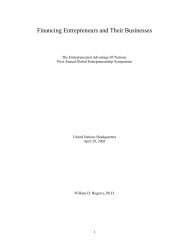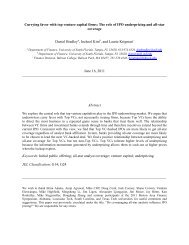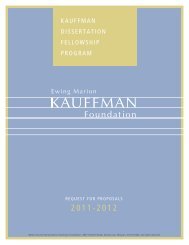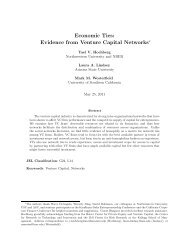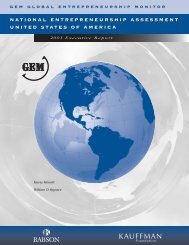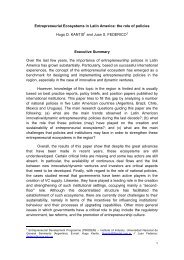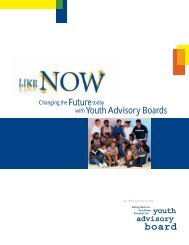Financing Child Care in the United States - Ewing Marion Kauffman ...
Financing Child Care in the United States - Ewing Marion Kauffman ...
Financing Child Care in the United States - Ewing Marion Kauffman ...
You also want an ePaper? Increase the reach of your titles
YUMPU automatically turns print PDFs into web optimized ePapers that Google loves.
COMMUNITY AND PUBLIC<br />
SECTOR PARTNERSHIPS<br />
ACCREDITATION FACILITATION<br />
PROJECT FOR NEW JERSEY (NEW<br />
JERSEY)<br />
DESCRIPTION<br />
The Accreditation Facilitation Project for New Jersey is a<br />
public–private partnership. Its goal is to <strong>in</strong>crease <strong>the</strong><br />
number of child care centers accredited by <strong>the</strong> National<br />
Association for <strong>the</strong> Education of Young <strong>Child</strong>ren<br />
(NAEYC) from 130 to 260 over a two–year period. The<br />
project is statewide <strong>in</strong> scope, focus<strong>in</strong>g 80 percent of its<br />
resources on early childhood programs serv<strong>in</strong>g <strong>the</strong> state’s<br />
most disadvantaged children and families.<br />
WHEN ESTABLISHED<br />
The Accreditation Facilitation Project for New Jersey was<br />
planned and designed <strong>in</strong> 1998 and 1999, and<br />
implementation began <strong>in</strong> March 2000.<br />
ANNUAL AMOUNT<br />
The total amount of <strong>the</strong> fund<strong>in</strong>g committed for <strong>the</strong><br />
two–year period is approximately $1.5 million. The<br />
partnership is f<strong>in</strong>anced by <strong>the</strong> State of New Jersey, <strong>the</strong><br />
Schumann Fund of New Jersey, <strong>the</strong> Lucent Technologies<br />
Foundation, Johnson & Johnson, o<strong>the</strong>r New Jersey<br />
foundations and several members of <strong>the</strong> American<br />
Bus<strong>in</strong>ess Collaboration for Quality Dependent <strong>Care</strong><br />
(ABC).<br />
SERVICES FUNDED<br />
The overall goal of <strong>the</strong> Accreditation Facilitation Project<br />
for New Jersey is to improve <strong>the</strong> quality of child care<br />
offered to children, particularly low–<strong>in</strong>come children, by<br />
assist<strong>in</strong>g 130 child care programs to become accredited.<br />
These programs are <strong>the</strong>n positioned to take advantage of<br />
<strong>the</strong> higher state reimbursement rate available to<br />
accredited child care programs serv<strong>in</strong>g low–<strong>in</strong>come<br />
children.<br />
Nearly 60 percent of <strong>the</strong> resources are devoted to<br />
work<strong>in</strong>g with centers <strong>in</strong> what are known as <strong>the</strong> “Abbott<br />
Districts.” As a result of school f<strong>in</strong>anc<strong>in</strong>g equity litigation<br />
<strong>in</strong> New Jersey, 30 school districts, which toge<strong>the</strong>r serve<br />
75 percent of <strong>the</strong> poor and m<strong>in</strong>ority students <strong>in</strong> New<br />
Jersey, are required to develop and offer high–quality<br />
prek<strong>in</strong>dergarten child care programs for all 3– and<br />
4–year–old children <strong>in</strong> those districts. (While <strong>the</strong> provision<br />
of <strong>the</strong> program is required, participation is voluntary.) The<br />
accreditation project provides up to $13,000 on a per<br />
center basis <strong>in</strong> <strong>the</strong> Abbott Districts.<br />
The rema<strong>in</strong><strong>in</strong>g funds are split between child care centers<br />
<strong>in</strong> New Jersey’s Early <strong>Child</strong>hood Program Aid (ECPA)<br />
districts, <strong>in</strong> which at least 20 percent of <strong>the</strong> children<br />
enrolled are eligible for free or reduced–price school<br />
lunch, and non–ECPA centers. Although <strong>the</strong> number<br />
varies from year to year, through ECPA New Jersey<br />
provides support for preschool and related early<br />
childhood programs <strong>in</strong> 135 school districts (FY1999–00)<br />
serv<strong>in</strong>g low–<strong>in</strong>come children, as well as o<strong>the</strong>r child care<br />
centers <strong>in</strong> New Jersey. Up to $9,800 is made available to<br />
<strong>the</strong> Early <strong>Child</strong>hood Program Aid centers and up to<br />
$7,400 is available to non–ECPA centers.<br />
F<strong>in</strong>ancial resources to assist with a facilitated approach<br />
to accreditation, enhancement grants for use at <strong>the</strong> sites<br />
and scholarships for staff to pursue <strong>Child</strong> Development<br />
Associate and Certified <strong>Child</strong> <strong>Care</strong> Professional<br />
credentials, as well as associate’s and bachelor’s degrees,<br />
are available to all participat<strong>in</strong>g centers.<br />
HOW FUNDS DISTRIBUTED<br />
The lead organization for <strong>the</strong> Accreditation Facilitation<br />
Project for New Jersey is <strong>the</strong> New Jersey Professional<br />
Development Center, charged with enhanc<strong>in</strong>g<br />
professional standards, improv<strong>in</strong>g articulation among<br />
degree–grant<strong>in</strong>g <strong>in</strong>stitutions <strong>in</strong> early childhood and<br />
provid<strong>in</strong>g technical and f<strong>in</strong>ancial assistance toward career<br />
development and accreditation. The center, <strong>in</strong> turn, has<br />
contracted with eight regional organizations to select<br />
participat<strong>in</strong>g centers, and provide technical and f<strong>in</strong>ancial<br />
support towards accreditation. Each regional organization<br />
works with a cohort of approximately 16 child care<br />
centers.<br />
POPULATION SERVED<br />
The Accreditation Facilitation Project is focused on<br />
improv<strong>in</strong>g quality <strong>in</strong> child care statewide, particularly <strong>in</strong><br />
areas serv<strong>in</strong>g low–<strong>in</strong>come children. Along with centers<br />
served with<strong>in</strong> <strong>the</strong> framework of <strong>the</strong> Abbott Districts and<br />
ECPA focus on low–<strong>in</strong>come children, some centers are<br />
nom<strong>in</strong>ated by <strong>the</strong> fund<strong>in</strong>g partners from <strong>the</strong> American<br />
Bus<strong>in</strong>ess Collaboration.<br />
STRATEGIC CONSIDERATIONS<br />
• Planners of <strong>the</strong> <strong>in</strong>itiative cite two significant<br />
factors that led to <strong>the</strong> project. First was <strong>the</strong> decision by<br />
<strong>the</strong> State of New Jersey to create a rate differential for<br />
accredited child care programs participat<strong>in</strong>g <strong>in</strong> <strong>the</strong><br />
state’s subsidized child care program. Planners<br />
believed that this would give programs a viable way to<br />
susta<strong>in</strong> better quality. Additional impetus came <strong>in</strong> large<br />
part through <strong>the</strong> Abbott v. Burke educational equity<br />
litigation. Through this litigation, <strong>the</strong> New Jersey<br />
Supreme Court ordered <strong>the</strong> state to fund <strong>the</strong> provision<br />
of preschool services for 3– and 4–year–old children<br />
<strong>in</strong> 136 school districts that serve New Jersey’s<br />
low–<strong>in</strong>come families. The court urged public school<br />
districts to collaborate with <strong>the</strong> exist<strong>in</strong>g community–<br />
based child care centers to provide <strong>the</strong>se programs.<br />
144






